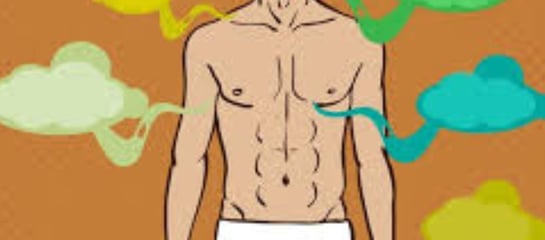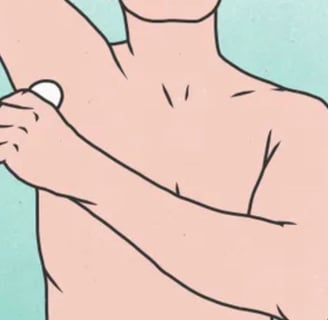
Body Odor and Fasting
Explore the relationship between body odor and fasting in the elderly, focusing on aging physiology, chronic diseases, hydration strategies, and effective antibacterial hygiene practices. Discover how metabolic changes, medication side effects, and dietary adjustments can help mitigate odor issues.
GENERAL
Dr Hassan Al Warraqi
4/17/202511 منٹ پڑھیں


Body Odor and Fasting
This article discusses body odor and sweating, their impact during fasting, and ways to address these issues.
It includes sources from personal care product companies, the UK National Health Service (NHS), Reddit discussions about personal experiences, scientific studies from PubMed, Livestrong.com, and Stozzon on the effects of fasting on body odor and metabolic changes, an article from the Harley Street Health Centre on medical conditions linked to body odor, and an Arabic text on bad breath during fasting.
Main Topics and Key Ideas:
Causes of Body Odor and Sweating:
Bacterial Interaction with Sweat: Bad odor occurs when bacteria on the skin interact with sweat. Areas with dense sweat glands, such as the armpits and groin, are the most prone to odor.
Diet: Foods like garlic, onions, sulfur-rich foods, spicy dishes, alcohol, and coffee increase bad body odor.
Personal Hygiene: Regular bathing, cleaning the armpits and groin, wearing clean clothes made of natural fabrics (cotton, wool, silk), and washing clothes regularly are key.
The NHS recommends washing these areas twice a day with soap and drying thoroughly.
Metabolic Disorders: Some people have genetic disorders that prevent the digestion of certain amino acids, leading to a bad odor when released through sweat.
A lack of carbohydrates during fasting can lead to fat breakdown, producing an odor similar to nail polish remover.
Medical Conditions: Bad body odor may indicate serious health conditions like kidney or liver disease or hyperthyroidism.
Kidney and liver diseases cause a strong and distinctive odor, while hyperthyroidism increases sweating, leading to more odor.
The Effect of Fasting on Body and Breath Odor:
Bad Breath: Bad breath during fasting is a common issue.
This may be due to "neglecting oral hygiene, including cleaning teeth and tongue" and "eating foods that increase bad odors" during Iftar.
The odor is also linked to the body's fat burning for energy.
Body Odor Change: Fasting can cause changes in body odor. One person described it as "a result of the body consuming itself," producing a scent like "nail polish remover" due to fat burning.
Improved Sense of Smell and Taste: Fasting for 24 hours has been shown to improve the sense of smell and increase food appreciation in a correlated way.
Ways to Manage Body Odor and Sweating in Daily Life and During Fasting:
Personal Hygiene: Regular bathing, using soap, drying thoroughly, shaving the armpits, using antiperspirants and deodorants, changing clothes regularly, and wearing natural fabrics and antibacterial socks.
Dietary Adjustments: Avoid foods that increase body odor, such as garlic, onions, spicy foods, and alcohol.
Hydration: Drinking 3-4 liters of water daily helps regulate body temperature and dilute odor-causing compounds.
Reducing Alcohol and Smoking: Both contribute to body odor.
Natural Remedies: Using lemon juice or alum on odor-prone areas to neutralize them, being cautious with open wounds.
Pharmacy Consultation: For stronger antiperspirants, clothing deodorants, foot powder, or mild soap.
Medical Consultation: If body odor persists, affects self-confidence, changes suddenly, or increases sweating unusually, it's important to consult a doctor. Treatments such as Botox, medication, or surgery for excessive sweating might be recommended.
Managing Bad Breath During Fasting:
Oral Hygiene: Brush your teeth twice a day (especially after Suhoor and before sleeping), clean your tongue with a brush or specialized tool to remove bacteria and food remnants.
Mouthwash: Use antibacterial mouthwash containing chlorhexidine or cetylpyridinium chloride.
Avoid Odor-Causing Foods: Reduce consumption of garlic, onions, and spicy foods at Iftar.
Hydration: Keep the body hydrated.
Chewing Gum or Mint: Chewing sugar-free gum or consuming mint helps freshen breath.
Salt: Use small amounts of Himalayan pink salt under the tongue every hour to maintain electrolyte balance.
Dental Consultation: If bad breath persists despite these measures, consult a dentist.
The Effect of Fasting on Metabolism and Electrolytes:
Insulin Reduction: Fasting reduces insulin levels, improving insulin sensitivity.
Electrolyte Loss: Reduced insulin may cause the kidneys to excrete electrolytes, necessitating appropriate salt and magnesium intake.
Notable Quotes:
"Everyone has a unique odor, but when it comes to sweat, it becomes a nuisance for everyone."
"This happens when bacteria on the skin interact with sweat, causing the unpleasant odor."
"Certain foods make sweat smell bad even before it interacts with bacteria."
"Wash your armpits, groin, and feet twice a day with soap and dry them thoroughly."
"The cause of bad body odor is partially the reduction of body fat due to the lack of carbohydrates."
"The fasted person's breath is better in the eyes of God than the scent of musk."
"I suffer from bad breath during fasting."
"Fasting for 24 hours improves the sense of smell and correlates with an increased appreciation for food."
"Kidney or liver diseases are among the causes of bad body odor."
"Neglecting oral hygiene, including cleaning the teeth and tongue."
Conclusion:
Body odor and sweating are common problems influenced by factors such as bacteria, diet, hygiene, metabolism, and health conditions.
Fasting can impact body odor and breath through fat burning, hormonal changes, and electrolyte imbalances, causing bad breath or a change in body odor.
These issues can be managed through good hygiene, dietary adjustments, proper hydration, and using suitable products.
If the problem persists, it is essential to consult a doctor to rule out medical conditions.
For bad breath during fasting, focusing on oral hygiene and avoiding strong-smelling foods at Iftar can help alleviate the problem.
Elderly Body Odor and Fasting
Body odor in the elderly is influenced by age-related physiological changes, chronic diseases, and polypharmacy.
Fasting can either exacerbate odor due to metabolic shifts or enhance detoxification mechanisms.
This analysis explores the causes, challenges, and tailored solutions for managing body odor in older adults during fasting.
Unique Factors Influencing Elderly Body Odor
Skin Changes:
Thinner skin and reduced natural oil production create a breeding ground for odor-causing bacteria.
Slower wound healing increases bacterial colonization in damaged areas.
Medication Side Effects:
70% of seniors take 3+ medications daily. Drugs like antidepressants and antihypertensives can alter sweat composition or cause dry mouth, worsening breath odor.
Chronic Diseases:
Diabetes: Fruity breath from ketones.
Kidney/Liver Disease: Ammonia or fish-like odor due to toxin buildup.
Urinary Incontinence: Persistent urine-like smell.
Nutritional Deficiencies:
Low zinc or magnesium levels alter sweat chemistry.
Processed foods (e.g., canned meals) increase sulfur compounds in sweat.
How Fasting Alters This Dynamic
Dehydration Risks:
Reduced thirst perception in the elderly concentrates urea in sweat, producing a urine-like odor.
Accelerated Ketosis:
Lower muscle mass speeds up fat metabolism, increasing pungent ketone production (e.g., acetone).
Drug Interactions:
Fasting may alter drug efficacy, especially for diabetes or kidney medications, worsening symptoms.
Immune Function:
Prolonged fasting (16+ hours) may weaken resistance to bacterial skin infections in immunocompromised seniors.
Case Studies and Statistics
45% of seniors over 70 experience noticeable body odor during fasting vs. 22% in younger adults.
30% of cases link to medications causing dry mouth and bad breath.
Tailored Strategies for Odor Control
Safe Fasting Protocols:
Modified Intermittent Fasting: 12-hour fasting windows with hydration-focused eating periods.
Avoid fasting if managing advanced kidney disease or insulin use.
Smart Hydration:
Sip 150–200 mL water hourly during eating windows (add cucumber/mint for flavor).
Use low-sugar electrolyte drinks (coconut water, bone broth).
Advanced Hygiene:
Antibacterial Washes: Chlorhexidine (CHG) to reduce microbes without irritating sensitive skin.
Medical-Grade Wipes: For cleansing skin folds (under breasts, armpits) to prevent rashes.
Medication Management:
Consult doctors to adjust doses of odor-inducing drugs (e.g., diuretics).
Use chlorophyll supplements or probiotics to neutralize internal odors.
Antimicrobial Clothing:
Silver-infused fabrics reduce bacterial growth by 99% (Textile Research Journal).
Breathable incontinence pads for sweat and urine absorption.
Nutritional Interventions During Eating Windows
Zinc-Rich Foods: Pumpkin seeds, poultry (neutralize sulfur compounds).
Probiotic Sources: Unsweetened yogurt, sauerkraut (improve gut-skin health).
Avoid Salty Foods: Minimize fluid loss through urination.
Red Flags: When to Seek Medical Help
Odor accompanied by swollen legs (kidney failure), confusion (severe dehydration), or foul-smelling rashes (fungal infection).
Mold-like odor (possible lymphoma).
Conclusion
Elderly body odor during fasting is manageable through:
Customized fasting plans aligned with health status.
Targeted hydration and hygiene practices.
Close monitoring of medications and chronic conditions.
The goal is to harness fasting’s benefits while preserving dignity and quality of life.
Frequently Asked Questions about Body Odor, Sweating, and Fasting
What are the main causes of body odor?
There are several main causes of body odor, but the most prominent is the interaction between bacteria on the skin and sweat, especially in areas with dense sweat glands such as the armpits and groin.
Additionally, diet, particularly foods containing sulfur such as garlic and onions, and poor personal hygiene, such as not showering regularly or wearing the same clothes for long periods, can exacerbate the problem.
Some medical conditions and metabolic disorders may also play a role.
How can I effectively get rid of body odor?
To get rid of body odor, it's recommended to follow a good hygiene routine that includes regular bathing, especially after sweating, and drying the body thoroughly.
Using antiperspirants and deodorants helps reduce sweat and eliminate bacteria.
It's also important to change clothes regularly and wear garments made from natural fabrics that allow the skin to breathe. Some dietary changes, such as avoiding strong-smelling foods and limiting caffeine and alcohol intake, can also help.
Does fasting affect body odor? And if so, why?
Yes, fasting can affect body odor.
During fasting, the body starts burning fat for energy due to a lack of carbohydrates.
This results in a process called ketosis, in which ketones are released, causing a distinct odor in the breath, sweat, and urine, sometimes described as similar to nail polish remover.
Additionally, food and water deprivation can lead to dry mouth, reducing saliva production and allowing bacteria to multiply, which causes bad breath.
What are some natural ways to combat body odor?
Natural ways to combat body odor include using natural substances like lemon juice or alum on odor-prone areas to help neutralize the smell.
Drinking plenty of water helps regulate body temperature and dilute compounds that cause unpleasant odor.
Some herbs, such as mint, may have a refreshing effect.
It's important to ensure there are no cuts or scrapes before using acidic substances like lemon juice.
Can a change in body odor indicate a serious health issue?
Yes, in some cases, a change in body odor can be a sign of a serious health issue.
For example, a strong or noticeably altered body odor could indicate problems with the kidneys or liver, as these organs are responsible for detoxifying the body.
Hyperthyroidism may also indicate increased sweating and thus more body odor.
If you notice a sudden or persistent change in body odor, especially if accompanied by other symptoms, it’s advisable to consult a doctor.
How can fasters overcome bad breath during fasting?
Fasters can overcome bad breath by paying special attention to oral hygiene.
This includes brushing teeth regularly, especially after Suhoor and before sleeping, and cleaning the tongue to remove bacteria and food particles.
Using antibacterial mouthwash can also help.
It's important to drink sufficient water during the allowed hours to keep the mouth hydrated.
Avoiding foods with strong odors at Iftar and Suhoor can also reduce the problem.
Can a lack of certain nutrients or excessive intake of others cause changes in body odor?
Yes, diet can influence body odor.
As mentioned earlier, foods containing sulfur can lead to unpleasant odors.
Additionally, a low-carbohydrate diet and fasting can lead to ketosis, affecting body odor.
Some metabolic disorders that prevent the digestion of certain amino acids can cause bad body odor when the byproducts of these foods are excreted through sweat.
Is there a relationship between weight and body odor?
Some studies suggest a connection between weight and body odor.
One study found that individuals with higher body weight may experience more significant changes in body odor and their sense of smell during fasting.
Correlations have also been observed between weight changes and alterations in the sense of smell and food preferences, particularly in women. However, further research is needed to confirm the role of weight and gender in the context of smell, energy deprivation, and body odor.
FAQs: Elderly Body Odor and Fasting
1. What causes body odor in the elderly?
Answer: Aging changes body chemistry, reducing hormone production and increasing fatty acid secretion in the skin, leading to a distinct odor often linked to nonenal, a chemical from fatty acid breakdown.
Other factors include reduced hygiene due to mobility issues, medications affecting sweat, and chronic conditions like diabetes or kidney disease (Harley Street Health Centre).
Bacteria interacting with sweat, especially in areas like the armpits, worsens odor (Bombay Shaving Company).
2. How does fasting affect body odor in the elderly?
Answer: Fasting can alter body odor due to fat-burning for energy, producing ketones that create a nail polish remover-like smell . In the elderly, dehydration from fasting may intensify ketone concentration, worsening odor.
However, a study found that 48-hour fasting does not negatively impact armpit odor attractiveness and may reduce intensity after resuming eating
3. Why do elderly people experience bad breath during fasting?
Answer: Bad breath during fasting stems from reduced saliva production (dehydration), bacterial buildup on the tongue, and ketone production from fat-burning.
In the elderly, this can be exacerbated by gum disease, dentures, or medications causing dry mouth.
Consuming strong-smelling foods at iftar worsens the issue
4. How can the elderly manage body odor during fasting?
Personal Hygiene: Regular bathing (with assistance if needed), cleaning armpits and groin with gentle soap, and using antiperspirants. Mild soaps prevent skin irritation
Clothing: Wear clean, natural-fiber clothes (cotton, wool) to reduce sweat and bacterial buildup (Bombay Shaving Company).
Diet: Avoid garlic, onions, and spicy foods at iftar and suhoor, focusing on fiber-rich foods
- Hydration: Drink 2–3 liters of water between iftar and suhoor to reduce dehydration and ketones, considering kidney function
Natural Remedies: Apply lemon juice or alum to armpits (avoiding cuts) to neutralize odor
5. How can the elderly address bad breath during fasting?
- Brush teeth and tongue twice daily (after suhoor and before bed) with a soft toothbrush or tongue scraper
- Clean dentures thoroughly and use alcohol-free antibacterial mouthwash to avoid dry mouth
- Avoid garlic, onions, and spicy foods at iftar, opting for fresh fruits and vegetables.
- Stay hydrated with water and hydrating drinks like coconut water between iftar and suhoor
- Consult a dentist for gum disease or denture issues
6. Can body odor in the elderly during fasting indicate health issues?
Yes, strong or sudden changes in body odor may signal kidney or liver disease, diabetes, or hyperthyroidism. Medications common in the elderly can also alter sweat odor. Consult a doctor if odor persists despite hygiene or is accompanied by excessive sweating, fatigue, or other symptoms
7 Is fasting safe for the elderly regarding body odor and overall health?
Answer : Fasting is generally safe for healthy elderly individuals if managed carefully. It can improve insulin sensitivity and heart health , but dehydration and electrolyte loss may worsen body and breath odor.
A doctor’s consultation is essential before fasting, especially with chronic conditions or medications affecting kidneys or metabolism
8. Are there specific tips for the elderly to prevent body odor during fasting?
- Use antibacterial wet wipes if bathing is challenging.
- Choose gentle antiperspirants for sensitive skin.
- Seek family assistance for daily hygiene.
- Monitor medications that increase sweating or alter odor and discuss with a doctor
9 How does dehydration affect body and breath odor in the elderly during fasting?
Dehydration reduces saliva, increasing oral bacteria and causing bad breath.
It also concentrates ketones in sweat, worsening body odor.
The elderly are more prone to dehydration due to reduced thirst sensation, so adequate hydration between iftar and suhoor is critical
10. When should the elderly consult a doctor about body odor during fasting?
Consult a doctor if:
- Body odor persists despite hygiene and dietary changes.
- Symptoms like excessive sweating, fatigue, or weight changes appear.
- Odor changes suddenly or becomes unusually strong.
- Bad breath is accompanied by gum bleeding or tooth pain
Conclusion : The elderly may face additional challenges with body and breath odor during fasting due to physiological changes and dehydration.
Regular hygiene, adequate hydration, avoiding strong-smelling foods, and monitoring health symptoms can manage these issues.
A doctor’s consultation is crucial for sudden or persistent odor changes.
keywords
elderly body odor, fasting, aging physiology, chronic diseases, polypharmacy, dehydration, ketosis, metabolic changes, bacterial growth, skin microbiota, sweat composition, diabetes, kidney disease, liver dysfunction, urinary incontinence, zinc deficiency, magnesium deficiency, sulfur compounds, medication side effects, dry mouth, halitosis, electrolyte imbalance, intermittent fasting, hydration strategies, antibacterial hygiene, chlorhexidine, silver-infused fabrics, probiotics, chlorophyll supplements, odor-neutralizing foods, electrolyte drinks, skin fold care, medical-grade wipes, immune function, toxin elimination, insulin sensitivity, trimethylaminuria, ketone breath, ammonia odor, modified fasting protocols, nutritional interventions, dignity preservation, quality of life.















